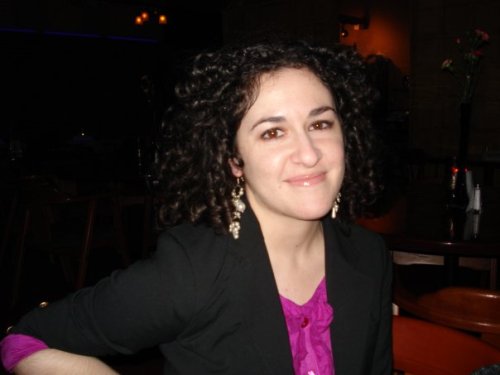 Founder of the smart and sassy website Muslimah Media Watch, Fatemeh Fakhraie is talented US writer who is definitely one to watch. She launched the site back in 2007 to tackle inaccurate portrayals of Muslim women and has become a vocal representative of the diversity of the Muslim women ever since. I caught up with her to talk about her website, “hijab reduction” and why Muslims need to make the most of the spotlight they were put under after 9/11.
Founder of the smart and sassy website Muslimah Media Watch, Fatemeh Fakhraie is talented US writer who is definitely one to watch. She launched the site back in 2007 to tackle inaccurate portrayals of Muslim women and has become a vocal representative of the diversity of the Muslim women ever since. I caught up with her to talk about her website, “hijab reduction” and why Muslims need to make the most of the spotlight they were put under after 9/11.
What motivated you to set up MMW? Was there a tipping point like 9/11 or the Hijab debate in France?
I have always been very uncomfortable with the way that mainstream media portrays Muslim women, because it’s usually in one of the three dominant stereotypes: exotic sex slave, oppressed woman, or dangerous terrorist. But, as a feminist, I also was very dissatisfied with feminist media portrayals of Muslim women, which often centered on the “oppressed woman” narrative. In 2007, I became more conscious of the blogosphere, and I realized that I could set up a media platform of my own. So I created Muslimah Media Watch as a response to all of this.
How do you feel about the success of MMW?
One of the things that gives me pride is knowing that MMW’s articles are often used in university-level gender and ethnic studies classes. The opportunity to teach students about Islamic feminism feels wonderful because this wasn’t something that I felt was represented or discussed when I was in school.
But success is a subjective term. I feel very ambivalent about whether MMW is successful, and I have a complicated relationship with that success. On one hand, I get so much support and encouragement from members in the Muslim community, and I believe that MMW is changing some people’s viewpoints and perspectives. And on the other hand, I am somewhat dissatisfied because we are very limited in our capacities— MMW is volunteer-based, and as a writer, I feel very frustrated that I can’t pay my writers or hire people to expand our multimedia presence so that we can reach more people.

Why do you think Muslim women face stereotyping?
In the West, Muslims and people from specific geographic regions or ethnic heritages are subject to more stereotyping because of a heightened global narrative of terrorism perpetrated by Muslims. So, as Muslims, women will be included in this mass profiling. Louise Cainkar’s book Homeland Insecurity: The Arab American and Muslim American Experience After 9/11 highlights the fact that many Muslim women are more visibly Muslim due to the headscarf, and are thus more likely to attract that type of attention that leads to stereotyping.
Why is it important that Muslim women (as opposed to Muslim men) respond to these media stereotypes?
Having other people speak on behalf of Muslim women isn’t only unnecessary (as we’re capable of thinking and speaking for ourselves), but it reinforces the stereotypes that Muslim women are silent creatures who aren’t allowed to have opinions or speak up.
It’s also important to speak up because it highlights the diversity of thought and opinion we have—when it comes to Islam, men and women are often put into huge, monolithic groups: “Muslim women wear this…” and “Muslim men believe this…” Speaking out reminds everyone that we think and act differently from each other.
Why do you think that Muslim women are speaking out now? What has changed now? What was holding them back before?
Muslim women have been thinking and writing and participating since the beginning of Islam. But I don’t think anyone’s been listening until now.
In the last 30 years especially, plenty of female scholars have been discussing issues and publishing books on feminism and media representation and religious interpretation. But, again, no one was paying attention.
I do think there’s a wonderful influx of differing Muslim women voices in the last ten years. I believe that some of this has been in response to 9/11 and the fact that, as Muslims, we have been forced into a spotlight. So now we’re under this spotlight, we may as well make the best of it and try and get people to understand who we are.

what is the role of the Internet?
The internet has played a wonderful role in Muslim women’s public spheres. While the internet helps disseminate plenty of harmful stereotypes, it also allows Muslim women to connect with families and like-minded men and women, it allows us to share our unique selves through blogs and other social media, and it helps connect us with resources that give us the tools to resist oppressive power forces.
Do you feel that sometimes Muslim women and their experiences are simplistically linked to the hijab?
Definitely. I think a lot of Muslim women are actually completely tired of talking about hijab (and I’m usually one of them), but everything we do seems to get linked back to this piece of cloth somehow. As much as we’d like to avoid the subject, we cover this “hijab reduction” a fair amount on MMW because it keeps on happening.














 This was one of those rare interviews which had the right proportions of freedom and control to really bring out interesting stuff. It was in
This was one of those rare interviews which had the right proportions of freedom and control to really bring out interesting stuff. It was in 

 Although Muslims have been visiting the shores of Britain as merchants and traders for centuries, the Yemenis were the first Muslim community to settle permanently in the UK back in the 1890s.
Although Muslims have been visiting the shores of Britain as merchants and traders for centuries, the Yemenis were the first Muslim community to settle permanently in the UK back in the 1890s.




